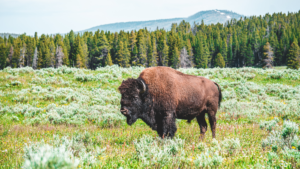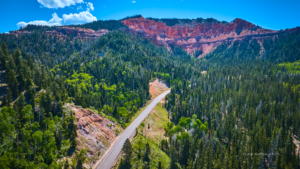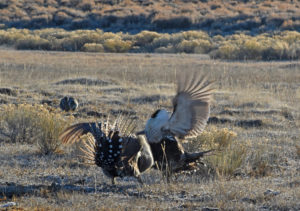For Immediate Release
September 24, 2018
Media contacts:
Erik Molvar, Western Watersheds Project (406) 830-3099
Mike Garrity, Alliance for the Wild Rockies, (406) 459-5936
MISSOULA, Mont. – A federal judge today restored Endangered Species Act protection to Yellowstone grizzly bears, a subpopulation of the species that was prematurely and illegally delisted last year. This long-term victory means that the bear will remain protected as a threatened species pending additional scientific analysis and a more robust plan for their recovery.
“Americans love the grizzly bears and want to see them meaningfully recovered before they lose their Endangered Species Act protections,” said Josh Osher, Montana Director of Western Watersheds Project. “We couldn’t be happier to see federal protection restored by today’s ruling, which affirms that sound science and the rule of law still trump political meddling in species recovery decisions.”
Despite the small populations of the bear, Idaho and Wyoming had planned to open hunting seasons for the bears starting September 1, 2018, but those plans were thwarted by two emergency restraining orders granted in the case. Today’s ruling offers a longer-term stop to the planned killing and an order to reexamine the current threats the grizzlies are facing.
“We know the Trump administration want to see grizzlies off the Endangered Species list and instead
mounted onto the walls of rich hunters like Trump’s sons,” said Mike Garrity, Executive Director of the Alliance for the Wild Rockies. “But the grizzly isn’t really recovered yet, and this incredible animal deserves better from humans than a rush to the taxidermist.”
The judge found that the U.S. Fish and Wildlife Service had ignored the overall welfare of grizzlies nationwide, stating in his ruling, “The ESA does not permit the Service to use the distinct population segment designation to circumvent analysis of a species’ overall well-being.” The judge also ruled that the U.S. Fish and Wildlife Service had failed in its obligation to base its de-listing decision on the best available science, finding that “First, by dropping a key commitment-the commitment to ensure that any population estimator adopted in the future is calibrated to the estimator used to justify delisting-the Service illegally negotiated away its obligation to apply the best available science in order to reach an accommodation with the states of Wyoming, Idaho, and Montana. Second, the Service relied on two studies to support its determination that the Greater Yellowstone grizzly can remain independent and genetically self-sufficient.”
The original grizzly bear recovery plan wisely required that the Yellowstone population be connected with other grizzly bear populations before being delisted, but the U.S. Fish and Wildlife Service expedited delisting despite the geographic and genetic isolation still facing the subpopulation. The Yellowstone bears are threatened by a changing climate and precarious food supplies, and their habitat has been encroached upon by commercial activities such as livestock grazing, which often results in lethal “management” for the native predator.
“These bears and today’s ruling are delivering a powerful message to the U.S. Fish and Wildlife Service,” said Dr. Sara Johnson, Director of Native Ecosystems Council. “You can’t ignore them and their need for range expansion and connectivity in the West.”
Tim Bechtold of Bechtold Law Firm of Missoula, Montana, David Bell, and Rebecca Smith represented Western Watersheds Project, Alliance for Wild Rockies and Native Ecosystems Council in the litigation.






